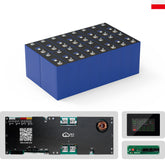How Much Energy Can You Get from a 100Ah 48V Battery
A 100Ah 48V battery is a powerful energy storage unit often used in solar systems, electric vehicles, backup power setups, and off-grid applications. Understanding how much energy such a battery provides is crucial for determining whether it meets your energy needs. In this article, we'll break down the watt-hours, usage scenarios, performance factors, and real-world considerations associated with a 100Ah 48V battery.
- What Does 100Ah 48V Mean?
- How to Calculate Watt Hours from a 100Ah 48V Battery
- Applications of a 100Ah 48V Battery
- Factors Affecting the Usable Energy of a 100Ah 48V Battery
- How Long Will a 100Ah 48V Battery Last?
- Charging a 100Ah 48V Battery
- Battery Lifespan and Maintenance
- Is a 100Ah 48V Battery Right for You?
- Alternatives and Add-Ons for a 100Ah 48V Battery
- Real-World Example Scenarios
- Common Questions About 100Ah 48V Batteries
- Final Thoughts
What Does 100Ah 48V Mean?
Understanding Amp Hours (Ah)
"Ah" stands for ampere-hour, a measure of electric charge. A 100Ah battery can provide 100 amps of current for one hour, or 10 amps for 10 hours, and so on. It's a way to understand capacity—not power, but how much current the battery can deliver over time.
Understanding Voltage (V)
Voltage represents the electrical potential or pressure. In this case, 48V means the battery has a nominal voltage of 48 volts, which is common in high-capacity systems such as solar or off-grid installations. Combining voltage and amp hours lets you calculate total energy in watt-hours.
How to Calculate Watt Hours from a 100Ah 48V Battery
Basic Formula
The energy stored in a battery in watt-hours (Wh) is calculated by:
Watt-hours (Wh) = Amp-hours (Ah) × Voltage (V)
For a 100Ah 48V battery, this means:
100Ah × 48V = 4,800Wh
This battery provides 4,800 watt-hours or 4.8 kilowatt-hours (kWh) of energy when fully charged.
What Does 4800Wh Mean in Practical Terms?
To put 4,800 watt-hours into context, this is enough energy to:
Run a 100W light bulb for 48 hours
Power a 1,500W space heater for about 3.2 hours
Operate a full-size refrigerator (200W average) for 24 hours
Charge 10 laptops with 50Wh batteries each, multiple times
>>See also Best Trusted Brands for 8V Golf Cart Batteries
Applications of a 100Ah 48V Battery
Solar Power Systems
The 100Ah 48V battery is commonly used in home and commercial solar energy setups. When paired with a solar charge controller and inverter, it becomes a reliable backup or off-grid power source.
Electric Vehicles and E-Bikes
Some electric vehicles and bikes use 48V battery systems. A 100Ah rating ensures that the battery can support significant driving range or motor operation time.
Off-Grid Cabins and RVs
If you're living off the grid or in a mobile setting, a 100Ah 48V battery can run your essentials like lights, fans, and small appliances, especially when combined with solar panels.
UPS and Backup Systems
In uninterruptible power supply (UPS) systems, the 100Ah 48V battery serves as a vital component, ensuring servers, routers, or medical devices stay operational during outages.
Factors Affecting the Usable Energy of a 100Ah 48V Battery
Depth of Discharge (DoD)
Most batteries should not be discharged to 0%. For lithium-ion batteries, 80–90% DoD is typical, meaning only about 3,840–4,320Wh is actually usable.
Battery Chemistry
Lithium-ion (LiFePO4): Higher efficiency, longer life, better DoD
Lead-acid (AGM or Gel): Lower efficiency, shorter life, limited DoD (~50%)
Lithium-ion is ideal for maximizing the potential of a 100Ah 48V battery.
Temperature Effects
Extreme temperatures affect battery capacity. Cold weather can reduce effective watt-hours, while excessive heat accelerates wear.
Inverter Efficiency
When converting DC from a 100Ah 48V battery to AC using an inverter, expect around 90% efficiency. This means you may only get 4,320Wh from your 4,800Wh battery.
How Long Will a 100Ah 48V Battery Last?
Powering Common Devices
Here’s how long a fully charged 100Ah 48V battery can run various appliances:
|
Appliance |
Power (W) |
Runtime (approx.) |
|
LED Light Bulb (10W) |
10 |
480 hours |
|
Mini Fridge (100W) |
100 |
48 hours |
|
Laptop (50W) |
50 |
96 hours |
|
Microwave (1000W) |
1000 |
4.8 hours |
|
TV (150W) |
150 |
32 hours |
Runtime Formula
Runtime (hours) = Watt-hours / Appliance Watts
This lets you estimate how long the 100Ah 48V battery will last in any scenario.
Charging a 100Ah 48V Battery
Solar Charging
A typical solar panel produces around 300W. To fully charge a 100Ah 48V battery (4800Wh), you’d need:
4800Wh / 300W = 16 hours of sunlight
Assuming about 5 peak sun hours per day, it takes ~3 days to fully recharge.
Grid Charging
With a 1,000W charger, a full charge from 0% to 100% takes:
4800Wh / 1000W = 4.8 hours
This can be faster depending on charger output and battery type.
Battery Lifespan and Maintenance
Cycle Life
Lithium-ion: 2,000–5,000+ cycles
Lead-acid: 500–1,000 cycles
For daily use, lithium-ion batteries offer a longer return on investment.
Maintenance Tips
Avoid deep discharges below recommended DoD
Store in a cool, dry place
Charge regularly if in standby
Monitor battery management system (BMS) status
These tips help extend the life of your 100Ah 48V battery.
Is a 100Ah 48V Battery Right for You?
When It Makes Sense
You should consider a 100Ah 48V battery if you need:
Medium to large off-grid energy storage
Reliable backup power for electronics or tools
An energy-efficient solution for RVs or cabins
Integration into a scalable solar system
When to Go Bigger or Smaller
Go bigger (e.g., 200Ah 48V) for whole-home systems
Go smaller (e.g., 50Ah 24V) for basic electronics or light camping
>>See also How Long Can a 36V Lithium Battery Provide Power An In Depth Look
Alternatives and Add-Ons for a 100Ah 48V Battery
Connecting Batteries in Parallel or Series
To increase capacity or voltage:
Parallel: Connect two 100Ah 48V batteries to get 200Ah at 48V
Series: Not typical for 48V setups, but combining 12V batteries in series to reach 48V is possible
Adding Solar Panels and Inverters
Maximize your battery's value by pairing it with:
MPPT solar charge controllers
Pure sine wave inverters
Energy management systems
Real-World Example Scenarios
RV Setup
In an RV, a 100Ah 48V battery can power:
Lighting
TV
Laptop
Mini fridge
Water pump
All for up to 24 hours, recharged with solar each day.
Home Backup
During a blackout, this battery can keep:
Router, Fridge, Lights, Laptop, Running for 12–24 hours, depending on usage.
Common Questions About 100Ah 48V Batteries
Can I Use It With a 24V Inverter?
No. A 100Ah 48V battery must be matched with a 48V inverter or step-down equipment.
Is It Safe?
Yes, with proper use. Lithium-ion batteries have built-in BMS to prevent overcharging, overheating, and over-discharging.
Can I Charge It with a Car Alternator?
Not directly. You’d need a DC-DC charger that supports 48V output.
Final Thoughts
The 100Ah 48V battery offers 4,800 watt-hours of usable energy, making it an ideal power source for solar energy systems, electric vehicles, RVs, and backup systems. Its capacity and voltage combination ensures high energy delivery, especially when paired with efficient components and proper maintenance. Whether you’re building a renewable setup or securing emergency power, a 100Ah 48V battery is a versatile and reliable option.
In conclusion, if you need a robust, scalable power source, a 100Ah 48V battery is one of the best investments you can make for your energy system.
























Leave a comment
All blog comments are checked prior to publishing